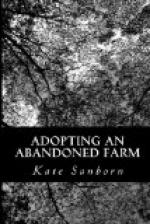Gail Hamilton said of her squashes:
“They appeared above-ground, large-lobed and vigorous. Large and vigorous appeared the bugs, all gleaming in green and gold, like the wolf on the fold, and stopped up all the stomata and ate up all the parenchyma, till my squash-leaves looked as if they had grown for the sole purpose of illustrating net-veined organizations. A universal bug does not indicate a special want of skill in any one.”
Not liking to crush the bug between thumb and finger as advised, she tried drowning them. She says: “The moment they touched the water they all spread unseen wings and flew away. I should not have been much more surprised to see Halicarnassus soaring over the ridge pole. I had not the slightest idea they could fly.”
Then the aphides! Exhausters of strength—vine fretters—plant destroyers! One aphis, often the progenitor of over five thousand million aphides in a single season. This seems understated, but I accept it as the aphidavit of another noted helminthologist. I might have imagined Nature had a special grudge against me if I had not recalled Emerson’s experience. He says: “With brow bent, with firm intent, I go musing in the garden walk. I stoop to pick up a weed that is choking the corn, find there were two; close behind is a third, and I reach out my arm to a fourth; behind that there are four thousand and one!
“Rose bugs and wasps appear best when flying. I admired them most when flying away from my garden.”
Horace Greeley said that “No man who harbors caterpillars has any moral right to apples.” But one sees whole orchards destroyed in this way for lack of time to attack such a big job. Farmers have been unjustly attacked by city critics who do not understand the situation. There was much fine writing last year in regard to the sin and shame of cutting down the pretty, wild growth of shrubs, vines, and flowers along the wayside, so picturesque to the summer tourist. The tangle of wild grape, clematis, and woodbine is certainly pretty, but underneath is sure to be found a luxuriant growth of thistle, wild carrot, silk weed, mullein, chickweed, tansy, and plantain, which, if allowed to seed and disseminate themselves, would soon ruin the best farms. There is a deadly foe, an army of foes, hiding under these luxuriant festoons and masses of cheerful flowers.
Isn’t it strange and sad and pitiful, that it is the summer guest who alone enjoys the delights of summering in the country? There is no time for rest, for recreation, for flowers, for outdoor pleasures, for the average farmer and his family. You seldom see any bright faces at the windows, which are seldom opened—only a glimpse here and there of a sad, haggard creature, peering out for curosity. Strange would it be to hear peals of merry laughter; stranger still to see a family enjoying a meal on the piazza or a game on the grass. As for flowers, they are valued no more than weeds; the names of the most common are unknown. I asked in vain a dozen people last summer, what that flower was called, pointing to the ubiquitous Joe Rye weed or pink motherwort. At last I asked one man, who affected to know everything—




